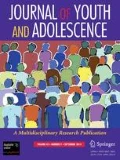Abstract
The relationship between ego identity status and MMPI scores was investigated using 73 college males. Identity status was assessed using a semistructured interview. The results obtained indicated that subjects in the identity achievement status obtained MMPI scores which fell within the normal range of functioning. Subjects currently involved in working on identity issues (moratorium status) obtained a pattern of scores indicating the presence of psychological conflict, as did foreclosure subjects—that is, subjects who are characterized by rigid adherence to parental norms and values. Subjects who had not successfully resolved their identity crisis (identity diffusion status) had MMPI scores within the normal range. The findings partly support Erikson's theorizing on ego identity and indicate that further analysis and refinement of Marcia's typology is required. Results from the present study also indicate that future research with male subjects on ego identity status should include some assessment of sexual attitudes.
Similar content being viewed by others
References
Block, J. (1961). Ego identity, role variability and adjustment.J. Consult. Psychol. 25:392–397.
Bob, S. R. (1970). An investigation of the relationship between identity status, cognitive style and stress. Doctoral dissertation, State University of New York at Buffalo, University Microfilms, Ann Arbor, Mich., No. 69-20, 586.
Carson, R. C. (1969). Interpretative manual to the MMPI. In Butcher, J. N. (ed.),MMPI: Research Developments and Clinical Applications, McGraw-Hill, New York, pp. 279–296.
Cross, H. J., and Allen, J. G. (1970). Ego identity status, adjustment, and academic achievement.J. Consult. Clin. Psychol. 34:288.
Erikson, E. H. (1956). The problem of ego identity.J. Am. Psychoanal. Ass. 4:56–121.
Erikson, E. H. (1959). Late adolescence. In Funkenstein, D. H. (ed.),The Student and Mental Health, World Federation for Mental Health and International Association of Universities, New York, pp. 66–106.
Erikson, E. H. (1968).Identity, Youth, and Crisis, Norton, New York.
Lipsig, F. S. (1968). A study of resolution of the “identity crisis” in male adolescents and its relationship to adjustment. Doctoral dissertation, New York University, University Microfilms, Ann Arbor, Mich., No. 68-4784.
Manosevitz, M. (1971). Education and MMPIMf scores in homosexual and heterosexual males.J. Consult. Clin. Psychol. 36:395–399.
Marcia, J. E. (1964). Determination and construct validity of ego identity status. Unpublished doctoral dissertation, Ohio State University.
Marcia, J. E. (1966). Development and validation of ego identity status.J. Personal. Soc. Psychol. 3:551–558.
Marcia, J. E. (1967). Ego identity status: Relationship to change in self-esteem, “general adjustment,” and authoritarianism.J. Personal. 35:118–133.
Orlofsky, J. L., Marcia, J. E., and Lesser, I. M. (1973). Ego identity status and the intimacy versus isolation crisis of young adulthood.J. Personal. Soc. Psychol. 27:211–219.
Podd, M. H. (1972). Ego identity status and morality: The relationship between two developmental constructs.Develop. Psychol. 6:497–507.
Podd, M. H., Marcia, J. E., and Rubin, B. M. (1970). The effects of ego identity and partner perception on a Prisoner's Dilemma Game.J. Soc. Psychol. 82:117–126.
Rasmussen, J. E. (1964). Relationship of ego identity to psychosocial effectiveness.Psychol. Rep. 15: 815–825.
Todor, N. L., and Marcia, J. E. (1974). Ego identity status and response to conformity pressure in college women.J. Personal. Soc. Psychol. 26:287–294.
Truax, C. B. (1957). The repression response to implied failure as a function of the Hysteria-Psychasthenia index.J. Abnorm. Soc. Psychol. 55:188–193.
Waterman, C. K., Bubel, M. E., and Waterman, A. D. (1970). Relationship between resolution of the identity crisis and outcomes of previous psychosocial crises. InProceedings of the 78th Convention of the APA, American Psychological Association, Washington, D. C., Vol. 5, pp. 467–468.
Author information
Authors and Affiliations
Additional information
This research was partly supported by research grants from the National Science Foundation (NSF-USDP No. GU 1598) and a grant from the National Institute of Mental Health (MH 16899). The senior author was supported by a National Science Foundation traineeship during the time this study was performed.
Clinical psychology graduate student, doing research on adolescent personality development from an Eriksonian perspective.
Received Ph.D. from the University of Minnesota. Current research is on adolescent personality development from an Eriksonian perspective.
Rights and permissions
About this article
Cite this article
Oshman, H., Manosevitz, M. The impact of the identity crisis on the adjustment of late adolescent males. J Youth Adolescence 3, 207–216 (1974). https://doi.org/10.1007/BF02214750
Received:
Issue Date:
DOI: https://doi.org/10.1007/BF02214750




